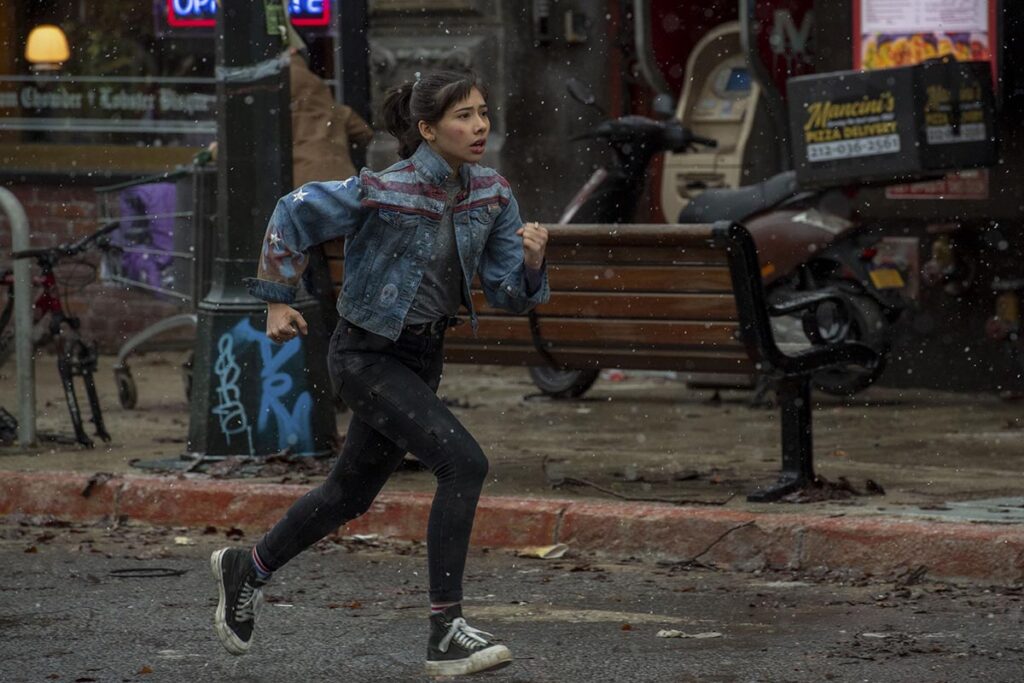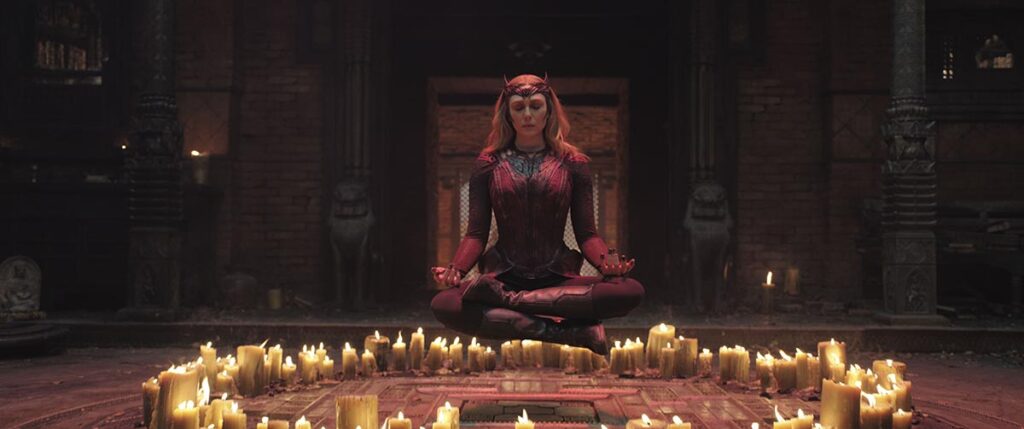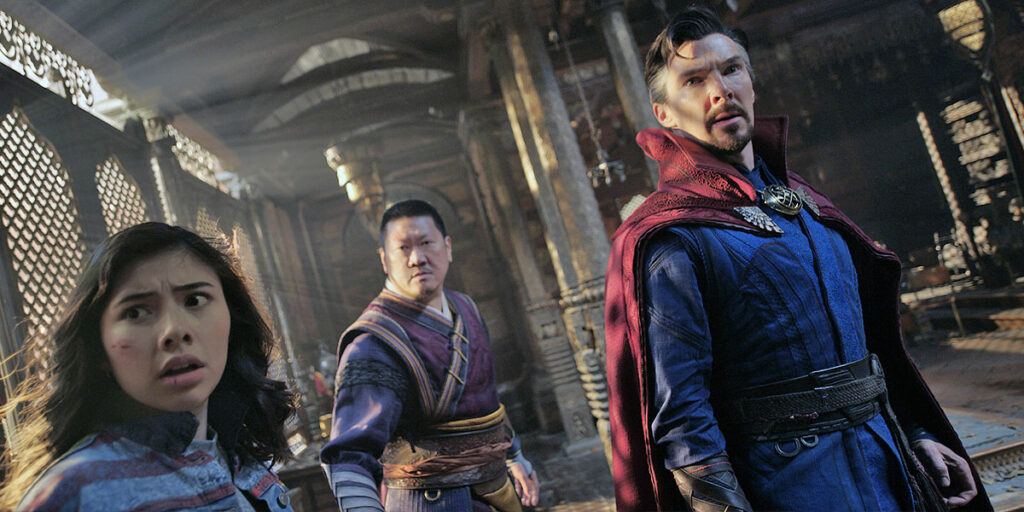Though technically well-crafted, Sam Raimi’s Doctor Strange in the Multiverse of Madness favours style over storytelling, and results in a chaotic film with little emotional impact.
What I’ve always appreciated about the MCU up till Doctor Strange in the Multiverse of Madness is how much of an emotional core most of these movies have. We’ve grown so incredibly attached to these characters that we often rewatch our favourite entries in the saga not because we’ve forgotten what happens in them but because it gives us pleasure to simply spend time with its protagonists, and watch them be their wonderful selves.
Since the release of Iron Man in 2008, the franchise has grown so much that we’ve now entered Phase Four, which began in 2021 with WandaVision, Loki, Eternals, Shang Chi and the Legend of the Ten Rings and more series and films whose main focus has been that of the Multiverse — a group of universes that all exist at the same time, where alternative versions of ourselves reside. Nowadays, these films and shows have become considerably more complex to follow, as not only are we now required to have seen all previous MCU entries, including episodic ones, in order to understand exactly what happens in most new releases, but a lot of abstract concepts have been introduced that have made these new films and series more demanding on an intellectual level.
The existence of a “sacred timeline” and a Time Variance Authority that controls it (Loki), the threat of evolved planet-eating dinosaurs and the immortal aliens keeping them at bay (Eternals), the possibility of human beings being replicated, controlled, and even created out of thin air (WandaVision), and even more themes and ideas are all part of a Phase Four that definitely asks us to concentrate and remember a whole lot more, but that, up till now, has always remained accessible to non-comic book fans precisely because of how gripping and emotionally affecting these films have been: even if not all viewers will always understand every single reference or cameo, they’ll still grow more attached to the characters and be left with an enjoyable adventure and a good dose of nostalgia at the end.
But if most previous entries in the franchise have managed to nail the balance between fan service and good storytelling (think of Spider-Man: No Way Home, which viewers can fully understand only if they’ve seen at least four previous Spider-Man films, but that all kinds of audiences have been able to enjoy regardless), Doctor Strange in the Multiverse of Madness marks a significant difference from its predecessors, as it is as full of comic book references as it is difficult to follow and, more importantly, enjoy if you haven’t paid close attention not only to Doctor Strange (2016) and WandaVision (and possibly another Phase Two series), but also to (to avoid spoilers) at least two 21st Century Fox franchises that were recently acquired by Disney, as well as having read about new character America Chavez in the graphic novels.

Without this previous knowledge, Doctor Strange in the Multiverse of Madness still remains a well-crafted film with impressive cinematography (John Mathieson, of Gladiator) and production design (Charles Wood, of Avengers: Endgame) as well as an incredible score (Danny Elfman, of The Nightmare Before Christmas), but that gives us no time to warm up to any of its characters nor truly understand their motivations, as so much happens in it and most conflicts are immediately resolved to leave room for the ones to come. Which is truly a shame, as the film does approach a series of interesting themes, from the nature of a hero to how grief turns us into monsters to the pursuit of happiness, but all of these ideas are moved to the background to leave room for more action and twists, and this ultimately makes for a gorgeous but ultimately forgettable, chaotic film.
In fact, it’s not easy to even try to explain what Doctor Strange in the Multiverse of Madness is about, as so much happens in it. The film revolves around its titular character Steven Strange (Benedict Cumberbatch, of The Power of the Dog) and, when we first meet him, he’s about to attend Christine’s (Rachel McAdams, of Spotlight) wedding. But the event is soon interrupted by the arrival of a giant one-eyed squid monster who would seem to be after a girl whom we’ll later come to know as America Chavez (Xochitl Gomez, of The Baby-Sitters Club). Since America is somehow not entirely unfamiliar to Steven, he comes to the rescue, aided by Sorcerer Supreme Wong (Benedict Wong, of Annihilation), and, since it soon becomes clear that girl comes from another dimension, the wizards decide to enlist the help of the only Multiverse expert they know, Wanda Maximoff (Elizabeth Olsen, of WandaVision).
What happens next is best left unsaid to avoid spoilers, but, if you’ve paid attention to the clues, it won’t really come as a surprise. Just like the title anticipates, some Multiverse travel is in order for Doctor Strange, and, like the trailer shows us, he’ll encounter more than one familiar variant as well as a new set of characters who may or may not be on his side, and deal with many magical objects, such as a “Book of the Damned” full of dark magic (the “Darkhold”) and its white magic equivalent (the “Book of the Vishanti,” which may or may not have been missing from the Sorcerer Supreme’s library in Doctor Strange). Of course, we’ve already encountered the Darkhold in WandaVision, where Agatha Harkness (Kathryn Hahn) taught us that the Scarlet Witch’s power “exceeds that of the Sorcerer Supreme,” and that she’s destined to “destroy the world,” and that might give you an idea of what Steven and Wanda might have to deal with in the film.

Wanda is a complex character in Doctor Strange in the Multiverse of Madness, and her journey of processing the grief of losing Vision (Paul Bettany), which began in WandaVision, is taken to a whole new level in the film, so much so that we see her constantly question her own purpose. Doctor Strange 2‘s Wanda is obsessed with finding her children and being a mother once more, and a nice parallel is established with Steven as they’re essentially both control freaks who are unable to be in charge of their own destinies — the former having lost everything she cared about and the latter having had to make a decision in Infinity War that affected millions of people, and still dealing with the aftermath of the “Blip”.
Not only that, but both Wanda and Steven make us question the very idea of what makes one a hero or a villain, as they both have a tendency to disregard the rules, even more so considering that, when they meet in the film, neither of them is really “needed” anymore. Steven, who is still being blamed by many for allowing so many people to be “erased” from the planet for five years, has lost not only his role of Sorcerer Supreme but also the chance of getting together with Christine, and Wanda has placed all her hopes in her children – a “family” that wouldn’t exist hadn’t she created it with magic.
If you’re a fan of Sam Raimi’s (of the original Spider-Man trilogy) work, you’ll probably like Doctor Strange in the Multiverse of Madness, because it feels very much like a Sam Raimi film: Doctor Strange 2 is Marvel’s darkest entry to date, with plenty of ominous worldbuilding, terrifying creatures and daring, disquieting physical transformations for our characters, enough to be reminiscent of the director’s earlier work. Benedict Cumberbatch gets to play several versions of Strange, one in particular with impressive physical acting, and it’s his performance that makes Steve’s growth in the film feel authentic. Elizabeth Olsen also excels, though her superb, scene-stealing portrayal of Wanda is made less effective by a screenplay (Michael Waldron, of Loki) that unfortunately often turns her into a caricature, depriving her of many of the shades we saw in WandaVision.
As America Chavez, Xochitl Gomez is definitely as much of a standout as Wanda and Steven are, and credit goes to the The Baby-Sitters Club actress for demanding our attention in every single scene, never making the character feel one-dimensional even when the film’s script hints at her backstory so quickly that you might miss it if you don’t pay attention. Though Wong is, as usual, given little to do, Benedict Wong also excels at making his scenes feel memorable regardless, embodying all the wisdom and charm of Tilda Swinton’s Sorcerer Supreme but also delivering a character that feels completely his own.
There’s a lot I haven’t mentioned so as not to delve into spoiler territory, such as the (more or less) unexpected characters from other franchises that appear in the film, some of which might actually be guessed from the trailer. My issue with those, as well as many of the events that take place in the second half of the film, is that everything happens so quickly that we barely have time to take it all in until the film moves onto something else, and this removes all possible conflicts from the equation to the extent that this action-packed, elaborate story feels incredibly boring to watch.
Not only that, but these old acquaintances who suddenly appear pretty much leave the scene right away, to let our heroes complete their quests, and this quick introduction and departure completely denaturates their very essence in the process. One cameo in particular is bound to inspire reactions from the public, if only for the fact that fans have been waiting to see this franchise enter the MCU for a long time, but the character in question is so painfully unneccessary to the plot that their inclusion in the film feels disrespectful towards the essence of the character itself.
Who knows, maybe in a few years’ time we’ll look back at Doctor Strange in the Multiverse of Madness with a newfound fondness, just like Captain America: The First Avenger was significantly improved by the nostalgia sparked by its successors. “Doctor Strange will return,” and, judging by this film’s ending, chances are we’ll soon get to take a deeper look into his past (which is only briefly hinted at, here) and find out more about the Eye of Agamotto and what it can do.
There are also at least one upcoming series and one potential future theatrical release that might recontextualise our brief meeting with some of the variants, and, though no future Loki projects have been announced yet, Tom Hiddleston is still tied to the character and this leaves us hoping he’ll get to have a bigger role in the multiverse and make it more enthralling. For now, my most anticipated Marvel film remains Thor: Love and Thunder, which might just give us some of the emotion that Multiverse of Madness lacks.
Doctor Strange in the Multiverse of Madness is now available to watch on digital and on demand.

